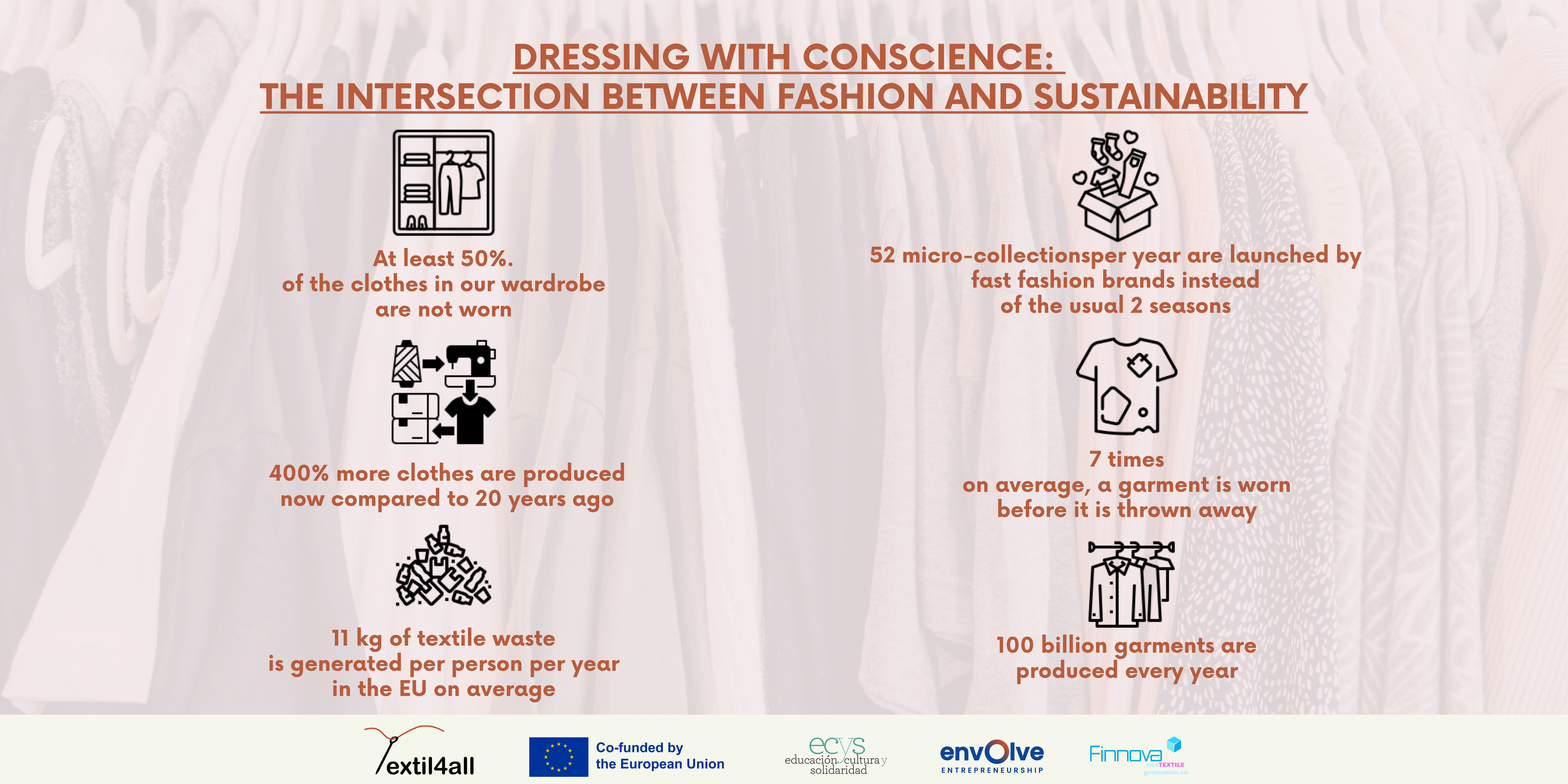- Super fast fashion production has led to 100 billion items of clothing being produced each year, 52 micro collections being launched by fast fashion brands per year, and 11kg of textile waste generated per person per year within the European Union alone.
- Fortunately, more and more consumers and companies are becoming aware of these problems and are looking for more sustainable alternatives.
- The European Textil4all project aims to promote a more sustainable textile industry committed to today’s environmental challenges.
The fashion industry has boomed in recent decades, but along with its success has also come environmental and social problems. The textile industry is one of the most polluting industries in the world, contributing significantly to water pollution, waste generation and greenhouse gas emissions. One of the biggest challenges facing this industry is the phenomenon known as «fast fashion»,a business model characterised by the mass production of garments at low prices, with reduced quality and short fashion cycles.
The super production of fast fashion has led to 100 billion garments being produced each year, 52 micro collections being launched by fast fashion brands per year, and 11kg of textile waste generated per person per year within the European Union alone. All these practices have intensified the current environmental crisis.
These mass production actions have influenced various natural resources, such as, for example, water pollution. In most countries where clothing is produced, untreated toxic wastewater from textile factories is discharged directly into rivers, causing damage to aquatic life. In addition, the massive water consumption within textile factories, where up to 200 tonnes of water is used per tonne of dyed fabric and 9,700 litres to produce a single kilo of cotton, puts tremendous pressure on this natural resource.
Microfibre pollution in the fashion industry is another determining factor in the current situation. Every time we wash a synthetic garment, around 700,000 individual microfibres are released into the water, reaching the plastic oceans. This plastic waste is ingested by fish, introducing plastic into our food chain.
Sustainable alternatives:
However, although the current outlook is affected by this negative situation, there are still things we can do to change. There are several alternatives and one of them depends on the consumer. Thus, choose clothes made in countries with environmental values, buy organic and natural fibres that do not require chemical products for production. Also, choose fibres with low water consumption such as linen or recycled fibres, and wash clothes at a lower temperature (30ºC), among others.
In short, the fashion industry faces a crucial challenge on its path towards sustainability. The transition to more ethical and sustainable fashion is not only necessary to protect our planet and the people on it, but also offers a unique opportunity to rethink the way we think about fashion and consumption.
Fortunately, more and more consumers and companies are becoming aware of these issues and are looking for more sustainable alternatives. These include solutions such as buying less, buying clothes from sustainable brands, investing in quality garments, reusing clothes by trying to donate or resell them, or even keeping an eye on the way clothes are washed.
Textil4all bets and promotes objectives aligned to the values of improving the current conditions in the textile sector, promoting a more sustainable textile industry and committed to the current environmental challenges, facing their negative consequences.
Textil4all is part of the European Erasmus+ programme funded by SEPIE-Spanish Service for the Internationalisation of Education with a budget of 60,000 euros and a duration of 19 months. Led by Educación, cultura y solidaridad (Spain), the project counts with Envolve (Greece) and Finnova Foundation (Belgium) as partners.
Join us in this mission to make the textile sector an engine for positive change!
About Educación Cultura y Solidaridad (ECyS)
Educación Cultura y Solidaridad is a non-profit association whose mission is to promote the integral development of people so that they can be protagonists of their own history and collaborate in the construction of social problems, promoting participation and local development for a fairer world and an inclusive society. To this end, it carries out actions of socio-educational intervention with people and groups with greater difficulty of inclusion, promoting their empowerment. The Centre is consolidated and recognised in San Cristóbal de los Ángeles (Madrid) as a point of reference for families, children and young people from different backgrounds and young people at risk of exclusion, to whom it offers the possibility of socio-professional and academic training.
About ENVOLVE
Envolve is a global organisation that supports entrepreneurship and innovation. Envolve Greece is part of Libra Social Responsibility, with initiatives offering educational and entrepreneurial opportunities, including support for RSL’s activities in response to the refugee crisis. Envolve is a member of the Ecosystex network (part of the European Technology Platform for the Future of Textiles and Clothing) and offers programmes that support entrepreneurship and sustainable enterprises.
About Finnova
The Finnova Foundation is a Spanish-Belgian non-profit organisation created in 2009 with the aim of promoting innovation both regionally and locally across Europe, and internationally through partner countries. Finnova focuses especially on innovation in the fields of new technologies or business models related to environmental sustainability and social inclusion.

